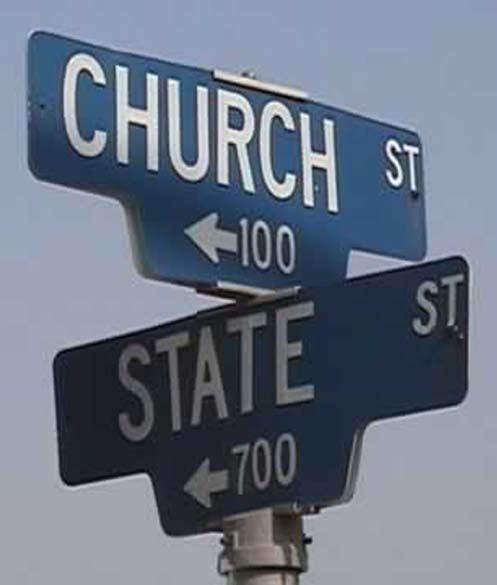Church and State
 Church and State Street: The Canadian Experience
Church and State Street: The Canadian Experience
Canada has made considerable progress over the past 150 years (mainly within the past 100 years) in advancing individual rights, particularly those of women, children, visible minorities, and lifestyle. Yet, many openly practice discrimination with impunity, and their right to do so is protected in our Charter of Rights and Freedoms.
It is an unusual situation in which a more accepting set of human values is applied by those considered to be non-religious, than is applied by Christians, Muslims, Jews and other faith-based organizations in their approach to those values.
Link Here for a 2014 historical perspective on Church and State
A continuing Conflict Zone In Canada
As Canada continues working to balance Church and State roles, we have much rocky terrain yet to negotiate. There is little doubt an open debate would be helpful, but if the current flashback and heated rhetoric over the wording of a government funding application is an example, the time has yet to arrive. It is unlikely any current government, Liberal, Conservative or NDP, would dare open the discussion as an election issue. Hence, it will be up to occasional bold government action and the courts to draw the line, as did Trudeau in 1969 when the Liberals removed abortion from the Criminal Code. Then, again, in 1982, the same government brought home the Constitution and developed the Canadian Charter of Rights and Freedoms.
Since then, a series of court, parliamentary and legislative decisions at the provincial and federal levels have helped push forward individual rights, particularly those affecting women, children, visible minorities and the LGBTQ community. While women have made considerable gains, many barriers still stand in their path as they march towards equality with men. (For an earlier article on the subject link to Women’s Suffrage.)
On a side note regarding my career in the police, when I first started in 1964, there were no sworn female members. The first came on board in the late 1970s, and as of 2023, the force is equally divided between male and female sworn officers, including Sergeants and a Deputy Chief. How many police departments in Canada, large or small, could match that division?
The most recent furore arising over a wording change in an employment grant application suggests how close to the surface the conflict remains. While there is no question religious groups provide exemplary work in many areas, they continue to reserve the right to discriminate in all manner of ways, particularly concerning women.
Another divisive debate that has wandered through Parliament over the past several decades revolves around one word in our National Anthem – the word “son,” a word now removed and replaced by “in all of us command” (here is an earlier post on the subject, “In all thy Son’s command.”
The Current Debate
In a recent front-page article in the National Post, a reporter, John Ivison states that grant applications will be denied unless the applicant “supports abortion.” How quickly the debate takes on an inflammatory tone. Even Fox News and right-wing religious groups in the US have jumped on the bandwagon, and neither is very subtle. In the National Post article, Ivison is not reporting but attempting to mould public opinion. (A bit of background on the Alberta chapter of Mustard Seed is posted in the footer).
Even though the courts and four out of five Canadians uphold women’s “reproductive rights,” it is a clause that was not even worthy of being given a second thought for most of our history. As a result, women were forced into the shadows, where many suffered grievous injuries and died on the altar of some religious group. One only needs to follow the path taken with almost every discriminatory practice to see it littered with bodies of the devout. Over the past twenty-five years, there has been a tsunami of reports from times when women and children had little or no power. As those old issues become settled, new ones take centre stage, particularly those where sexual predators abuse women, men, and children.
Even in the current reproductive rights conflict (not a debate), people forget that individual women and men are still free to follow their religious conscience. While no woman can be forced to have an abortion, she can be coerced into not having one by her religious group. She might even be pregnant because some groups made it a sin to use a contraceptive. Millions upon millions have died of Aids because of that sanction. It’s clear that within those groups, sex has but one purpose: to procreate. Stray outside the line to “sex for pleasure” and are eternally damned. Thank goodness an earlier government had the moral strength to say, “There is no place for the State in the nation’s bedrooms.” (Link)
It is within this background we see theist and mono-theist groups can discriminate to their heart’s content in any number of ways as the Charter of Rights protects that right. Following is a short list of approved discriminatory practices:
… reproduction (birth control and abortion),
… clerical inequality
… employment conditions
… student selection in faith-based schools and universities
… gender orientation
… dress codes (veils and other headdresses)
… marriages (gay, arranged, divorced)
… blood transfusions, vaccinations and other medical treatments,
… shunning, excommunication, etc.
… segregation by race, gender, status and other explicit means Religious Freedom
That is a short list of discriminatory practices where sanctions for transgressions are often far more significant than in any part of provincial, criminal or civil law. Any business in Canada implementing a single item on that list would soon be hauled before the courts or a tribunal. It would not matter how altruistic were their overall motives.
Regarding fund applications, the government is unequivocal about religious organizations parking their discriminatory practices at the boundaries of their belief system if they wish to access public funds. It’s astounding that despite all the discrimination carried out by religious groups, they still receive massive tax breaks (e.g. property taxes) and other grants (e.g. hospitals and schools) (link). Alberta still funds a sizeable faith-based hospital system where many of these discriminatory practices are allowed.
Regarding fund applications, the government is unequivocal about religious organizations parking their discriminatory practices at the boundaries of their belief system if they wish to access public funds. It’s astounding that despite all the discrimination carried out by religious groups, they still receive massive tax breaks (e.g. property taxes) and other grants (e.g. hospital and school systems).
The best path for religious groups to follow to retain their Charter rights to discriminate is to separate themselves from debt forgiveness and from taking public funds. Individual professional groups (e.g. doctors and lawyers) will also need to address these issues.
In the footer is an excerpt from an article by Dr James C. (Jim) Wallace posted on the Web Site hosted by David Anderson, Conservative MP, for Cyprus Hill/ Grassland (AB). Link here to full series of articles from the 4th Parliamentary Forum on Religious Freedom.
The following article focuses on the subject as it applies in Australia: It’s not just Islam, most religions are discriminatory,
Harold
Excerpt from the Article by James C. Wallace.
In Canada, we have only had 32 years for the Supreme Court to rule on the Charter of Rights and Freedoms and, thereby, to create the superstructure for religion in Canada. With each Supreme Court case, with each opinion interpreting the meaning of freedom of religion in Canada, the relationship between religion and state becomes more settled and secure.
Perhaps in the coming years, a landmark ruling by the Supreme Court of Canada on religion-state relations will create that singular metaphor, that all-encompassing archetype that embodies the fullness of Canadian values in the same way that Justice Hugo Black did for the United States back in 1947.
Perhaps the resolution of the Quebec constitutional question will bring renewed clarity about who we are as two peoples in relation to religion.
Perhaps Canada will proudly maintain its multiplicity of religion-state models even as we pride ourselves in our multicultural mosaic.
Background on the issue. This is the headline in the Calgary Sun that lead of this attack on Trudeau.
The first I heard on this issue came from the Calgary Sun article as reported by Licia Corbella, acting on comments by Mustard Seed CEO Stephen Wile. Here is his complaint:
“The Mustard Seed doesn’t take a position on abortion, but with the government making this a requirement for funding, it’s trying to force us from a neutral position to an affirmative position on abortion, and we’re not prepared to do that,” said Wile from his Calgary office.
“We’re not willing to support the government’s position in order to get the funds, it’s just not worth it for us.
“It seems,” added Wile, “like the government is saying, ‘The issue of where you stand on abortion is more important than the work you do and the people you serve,’ and that’s really sad. At the core of who we are, we’re really against fear and hate, and unfortunately, the government is taking a position that instead of decelerating division, it’s accelerating it.”
Here is a further bit of background suggesting Mr. Wile’s motives may not be as pure as he suggests. First, currently posted Mustard Seed job applicants are required to attest their support of the Mustard Seed Profession of Faith which, from my reading, comes mightily close to that of the Catholic Church. Not exact, but it comes close.
Going back just a bit further in time, in 2o10 the Alberta Government, under the leadership of Premier Ed Stelmach, awarded the Mustard Seed $12,000,000 ostensibly to build housing for the homeless. A worthwhile endeavour indeed, but did that come with any liturgical strings attached? Maybe yes, maybe no.
Now skip forward a few years to a time when Premier Stelmack stepped aside from leadership of the Alberta Conservative Party. Guess what position he now holds? No less than Chairman of the Board of Covenant Health, a parallel hospital system operated in Alberta by the Catholic Church.
In recent years that hospital service has run headlong into conflict with recent court decisions regarding women’s reproductive rights and the right to assisted dying. Here is one article: If Covenant Health cannot obey the law, they should not get public money.
Does this mean the Mustard Seed is not a worthy charity? Of course not, but let’s be clear about where the Mustard Seed sits on women’s rights. Are they neutral? Probably not. For starters, they could remove the faith requirement from their job application process as a demonstration of good will.
Harold (4130)
(4188)
Trackback from your site.

